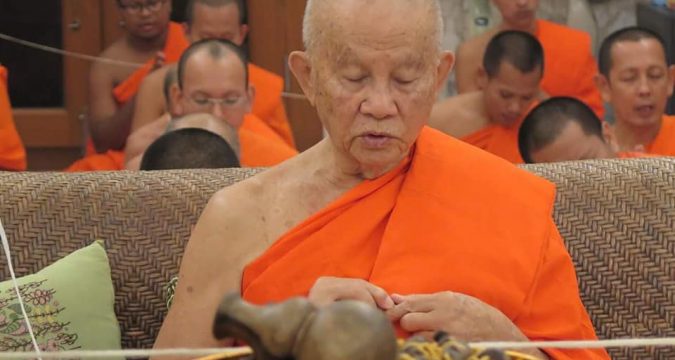

Wat Luang Phor Sodh first opened the first mediation retreat in 1982, helping monks become better qualified in the theory and practice of Dhammakaya mediation and eventually become meditation masters. Twice a year since then we have organized retreats from May 1-14 and December 1-14. During the May retreat, 300-400 monks and novices and approximately the same number of lay people and nuns attend the course. During the December retreat there are usually 400-600 monks and novices and a similar number of laity and nuns present.
Since then, Wat Luang Phor Sodh has been well recognized across the country. Recently, there are five different meditation retreat programs available at the temple which allow us to train over 20,000 people a year including monks, novices, students, laypeople, etc.
International outreach began when the Wat luang Phor Sodh Buddhist Meditation Institute (BMI) was approved as an Associated Institution of the World Buddhist University on April 19th, 2006, during the 23rd, General Conference of the World Fellowship of Buddhists at Fo Guang Monastery, Kaohsiung, Taiwan. The main purposes for international retreat are propagating: (1) The right Buddhist meditation knowledge so that all may have right practice, (2) The right understanding of Dhammakaya Meditation method and (3) The right practice of Dhammakaya Meditation for world peace.
INTERNATIONAL MEDITATION RETREAT
Most aspirants come seeking peace and happiness or relief from tension, and they find it. Beyond this, however, most find undreamed of treasures – self knowledge, heavenly joy, insight into reality, and possibly, even temporary experience of Nirvana. Such meditation can provide a road map for altruistic living which brings happiness for both oneself and others throughout life.
Wat Luang Phor Buddhist Meditation Institute (BMI) teaches the Samatha-Vipassana (Concentration-Insight) Meditation technique, also called Dhammakaya Meditation, rediscovered by Phra Mongkol-Thepmuni, Luang Phor Wat Paknam, in 1916. This is direct implementation of Lord Buddha’s key meditation instruction given in the Greater Discourse on the Four Foundations of Mindfulness. It has proved extremely effective and efficient. The technique integrates concentration into trance states of absorption (Jhana) with development of transcendental insight (Vijja). The meditator stops still at the center of the body, delving deeper and deeper inside, climbing higher and higher up a ladder of more and more refined inner bodies, feelings, minds, and Dhamma, transcending to Dhammakaya (Truth Bodies) and advancing through Noble Disciple states to experiencing Nirvana.
Samatha-Vipassana is guided, sitting meditation. The teacher provides spoken guidance during meditation. MP3 players are used for individual practice. BMI teaches meditation in English in two ways: (1) Meditation Guidance (Semi-private tutoring), and (2) Meditation Retreats
At BMI, international meditators take the middle path, adopting resolutions and procedures that demonstrate serious commitment and facilitate meditation progress, while eschewing excessive self-torment which can impede development. For example, participants take eight precepts [NO killing, stealing, sex, lying, intoxicants, eating after noon (just two meals per day), entertainments or luxurious beds]. No smoking is permitted at the temple, and meditators dress in simple white clothing (available at the temple store) to signify their commitment to self-purification. But, everyone sits comfortably, either cross-legged or on a chair, according to personal preference. And, we do not practice Noble Silence. Serious meditators just naturally become less talkative, but helpful exchanges among fellow students can be productive. The meditation technique attracts practitioners directly to more refined, purer and happier states.
Meditation Guidance
BMI offers Meditation Guidance or semi-private tutoring in English all year round, starting whenever you choose and lasting as long as you like. If you have the time, please try to come for 10 days to two weeks for the best result. It generally requires 5-7 days to develop the inner calm necessary for rapid progress. But, individuals vary greatly, so all are welcome for either longer or briefer periods.
The program has many options, so each meditator can adapt it to his or her own preferences. Breakfast is at 06:30 and lunch at 11:00. We practice 8 precepts, which implies no eating after noon. The core of each day is either three or four meditation sessions, depending on how long one can stay. Meditations average 45 minutes. They are usually intimate, with not more than 5-10 participants. Meditations are recorded on MP3 for individual practice, and provided on CD to take home (Group A at 07:00, 09:00, 01:00, & 03:00. Group B at 08:00, 10:00, 14:00 and 16:00.) Serious Buddhists often add Morning or Evening Chanting and Meditation, held everyday at 05:30 and 19:30. Even casual visitors enjoy attending once as a memorable experience. At Evening Chanting, meditators can be taught personally, in English, by the revered Meditation Master, Dr. Phra Rajyanvisith.
Other memorable experiences include going along on the morning alms round at 6:00 AM and practical “how to live a good life” discussions with Phra Bill. For those who volunteer to teach, perhaps most memorable are the fun interactions with monks and novices eager to learn and practice English (Daily 12:30-14:00). Participants interested in learning more about Buddhism can do this through directed readings and discussion. Finally, most unforgettable for those who can scale the heights, is the indelible experience of the most lovely, most serene state ever experienced – Nirvana.
The meditation atmosphere is the middle path — serious, but not overly harsh, with considerable flexibility in accordance with each participant’s preferences. Meditators wear simple, white clothes to signify purity. Some white clothing is available free and top quality new outfits are available at the temple administration office for 490 or 990 Baht per set. Meditators take eight precepts — no killing, stealing, sex, improper speech, intoxicants, eating afternoon, partying or entertainments or ornaments or makeup, and no high or luxurious beds. Sleeping is generally on thin mattresses on the floor under mosquito nets. Tents are available for those seeking more seclusion. There is no smoking on the Wat campus.
Retreat Schedule
| Day 1 | Every Day | Last Day |
| 05:30 Morning Chanting (Opt) 06:30 Breakfast 09:00 Opening Ceremony 11:00 Lunch 12:00 Orientation, Tour & First Lecture 16:00 First Meditation 17:00 Discussion 19:30 Evening Chant (Opt) | 05:00 Morning Chanting (Opt) 06:30 Breakfast 07:00 Beginner Meditation #1 08:00 Intermediate & Advanced #1 09:00 Beginner Meditation #2 10:00 Intermediate & Advanced #2 11:00 Lunch 12:00 Rest or Teaching English1930 14:00 Beginner Meditation #3 15:00 Intermediate & Advanced #3 16:00 Beginner Meditation #4 19:30 Evening Chant (Opt for beginners) | 05:00 Morning Chanting (Opt) 06:30 Breakfast 07:30 Meditation 09:30 Last Meditation 10:30 Group Photo 11:00 Lunch: Final Banquet 12:30 Graduation Ceremony 14:30 Bus to Bangkok |
BMI offers three intensive retreats per year, May 1-14, August 1-14, and December 1-14. Retreats are similar to guided meditation, but more intensive, with a sunrise meditation at 05:30. They usually involve 20-30 international meditators. Several hundred monks and laity attend the Thai retreat simultaneously in May and December. During retreats there is more access to the venerable Meditation Master in joint Thai-English sessions. This is especially useful for those who become advanced. There is also more chance to study Buddhist practices, Vinaya, Dhamma and Chanting. The large number of participants necessarily implies less silence.
Facilities
Retreats promote the simple life in a beautiful refuge. Participants wear plain white clothes available at the Wat Mini Mart which also sells essentials and snacks. Beds are board frames topped with thin mattresses. Bathrooms are separate buildings with both Thai and Western toilets and showers in some stalls. The kitchen serves good Thai food – simple, but varied and often spicy. Most dishes are non-vegetarian – choose what suits you. Vegetarian food can also be provided, if the kitchen is given advance notice. Please complete the online registration form and indicate any special needs. Although the environment promotes solitude, one is not cut off. The Wat’s university library (Mon-Fri 8:00 am -6:00 pm) has Internet and is air conditioned. The local town, Damnoen Saduak, is only 15 minutes by Song Thaw (2 bench) buses that pass the Wat gate every 10-15 minutes. (One finds ATM machines and banks in the town, but the best exchange rate is at the airport upon arrival.) Buses to Bangkok (a 2-hour ride) stop at the Wat gate every 20 minutes. There are no taxis nearby. Participants wash clothes by hand.
For Meditation Guidance, women usually stay in the women’s dormitory or in the screened traditional Thai Sala on the lake shown. Men stay in the men’s dormitory, under the information center. Sleeping is generally on the floor on thin mattresses, under mosquito nets. All facilities have clean restrooms. Those seeking more complete escape from civilization can also stay in tents.
THAI MEDITATION RETREATS
All meditation retreats at Wat Luang Phor Sodh, except for international retreats, have basically the same daily schedule, though depending on the group to which one is assigned the difficulties of dhamma taught and the period of meditation will vary:
| 05:30 – 06:45 | Morning Chanting and Meditation |
| 7.00 | Breakfast |
| 09:30 – 11.45 | Meditation |
| 11.00 | Lunch |
| 14:00 – 15.00 | A Dhamma Lecture |
| 17.00 – 18.00 | Meditation Workshop |
| 19.30 – 21.30 | Evening Chanting and Meditation |

Daily lectures are given by renowned Dhamma teachers who are invited to come to the temple to speak. Meditation instruction can also be given in English by the abbot and by English speaking monks when available. Both visitors and residents will sleep in the Dhutanga-tradition under a special umbrella with mosquito-net called a KLOD [Klod]. They will stay in the parklands about the monastery grounds, in close contact with nature and trees, helping calm the mind which is very helpful for their meditation. The Lord Buddha taught many times, “There are these forests, these roots of trees. Meditate now, lest you regret it later.”
- Meditation Master Trainings

Wat Luang Phor Sodh has been selected as the National Coordination Center of Provincial Meditation Institutes of Thailand (Elected by the Directors of Provincial Meditation Institutes from all over the country at a Seminar and Practicum organized by the National Buddhist Office 23-25 April 2008 at Wat Yanawa, Bangkok, and recognized by the Sangha Body).
Each year, the Wat has two two-week courses, May and December 15-28 and expects to train over 700 monks over the course of the year.
- Bi-annual Meditation Retreats

The 2 main retreats for Thai-speakers take place May 1-14 and December 1-14.
The December retreat is the busiest with around 1,200 practitioners (400-600 monks and novices, and the rest nuns and lay-people), while the May retreat attracts around 600-700 participants. The retreats are open to all people, the laity taking the opportunity to undertake the 8 training precepts and practice along side the Sangha.
Note: At the end of the retreats # 1 and 2, all participants will receive a diploma, by either the abbot of Wat Paknam or the abbot of Wat Saket
- Meditation Retreats for Students
Wat Luang Phor Sodh has been appointed as the Center for Development of Virtues and Ethics for the Security of the Nation, Religion and Monarchy in the central region. All Thai schools are required to develop ethical programs for their students, and so each year there are over 15,000 students who come to practice meditation on weekends (Fri, Sat and Sun).
- Special Meditation Retreats
Specially requested retreats are held for groups of employees of the government, private organizations, institutes or associations are held throughout the year.
- Hot Season Ordination

The Middle of March is the major school break, and it is custom in Thailand that young boys spend part of their school holidays as novices at a monastery. Many boys like the idea so much that they return to the same monastery year after year. April 1-18 is Hot Season Ordination for boys between the ages of 10 and 18. It is required that they come to the Wat at least 7 days in advance of their ordination to receive orientation. Please check the schedule in the calendar section. If you have any questions, please https://www.facebook.com/Watluangporsodh/.
OTHER MEDITATION RETREAT PROGRAMS
Meditation Master Training Wat Luang Phor Sodh has been selected as the National Coordination Center of Provincial Meditation Institutes of Thailand (Elected by the Directors of Provincial Meditation Institutes from all over the country at a Seminar and Practicum organized by the National Buddhist Office 23-25 April 2008 at Wat Yanawa, Bangkok, and recognized by the Sangha Body). Each year, the Wat has two two-week courses, in both May and December 15-28 and, throughout the course of the year, expects to train over 700 monks.
Bi-annual Meditation Retreats The 2 main retreats for Thai-speakers take place from May 1-14 and from December 1-14. The December retreat is the busiest, with around 1,200 practitioners (with 400-600 monks and novices, and the rest nuns and lay-people), while the May retreat attracts around 600-700 participants. The retreats are open to all people, the laity taking the opportunity to undertake the 8 training precepts and practice alongside the Sangha.
Meditation Retreats for Students Wat Luang Phor Sodh has been appointed as the Center for Development of Virtues and Ethics for the Security of the Nation, Religion and Monarchy in the central region. All Thai schools are required to develop ethical programs for their students, and so each year there are over 15,000 students who come to practice meditation on weekends (Fri, Sat and Sun).
Hot Season Ordination The Middle of March is the major school break, and it is a custom in Thailand that young boys spend part of their school holidays as novices at a monastery. Many boys like the idea so much that they return to the same monastery year after year. April 1-18 is Hot Season Ordination for boys between the ages of 10 and 18. It is required that they come to the Wat at least 7 days in advance of their ordination to receive orientation. Please check the schedule in the calendar section. If you have any questions, please email us at bmi@dhammacenter.org for English and info@dhammakaya.org for Thai.
International Meditation Retreat
International outreach began when the Wat Luang Phor Sodh Buddhist Meditation Institute (BMI) was approved as an Associated Institution of the World Buddhist University on April 19th, 2006, during the 23rd, General Conference of the World Fellowship of Buddhists at Fo Guang Monastery, Kaohsiung, Taiwan. Since then, the main purposes for international retreats are propagating:
- The right Buddhist meditation knowledge so that all may have right practice,
- The right understanding of Dhammakaya Meditation method, and
- The right practice of Dhammakaya Meditation for world peace.
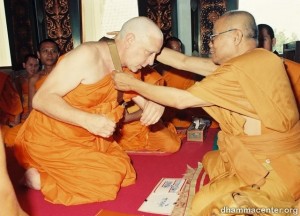
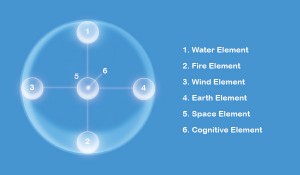
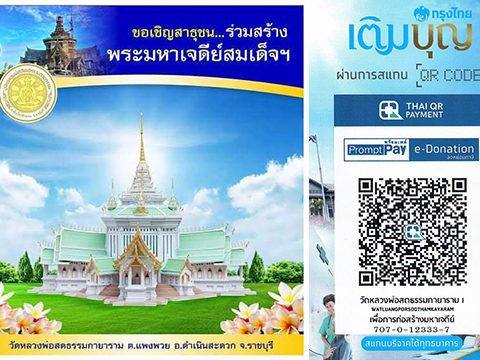




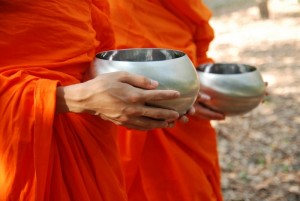
 ไลน์ "@wlps" เพื่อรับข่าวสารจากทางวัด
ไลน์ "@wlps" เพื่อรับข่าวสารจากทางวัด

